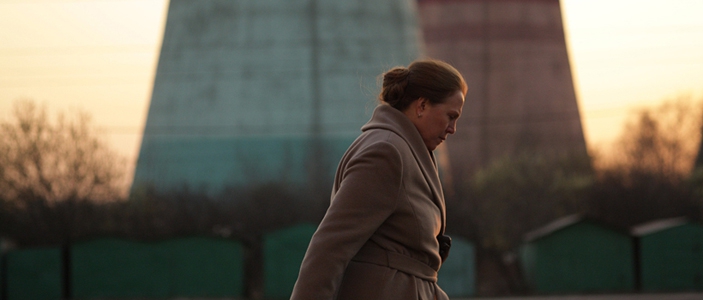Andrei Zvyagintsev Talks 'Elena'...
05/17/2012
Just off of a plane from Russia, Andrei Zvyagintsev seemed nervous about showing his latest work, Elena to American audiences. "How did you react to the first seven minutes?" he asked, curiously. "I'm sure Americans are used to something a little more... dynamic". He shouldn't be so concerned. The first shot in the film is a lengthy look at a branch outside the house of the fascinating eponymous character, who launches a desperate plot to help her children. This meditative story evolves into a stylish, class-sensitive update on film noir, bursting with high stakes and star-making performances. Elena opened at Film Forum on Wednesday, and BAM Cinematek also just hosted a program of Zvyagintsev's work called "The Next Director". Indiewire caught up with the filmmaker to talk about his latest work and how he got his start.
When did you decide to make films?
I fell in love with films because I was an actor originally. I was dreaming about movies on one side of the camera, imagining myself as an actor. I can't really pinpoint the moment when I found myself on the other side of the camera. It wasn't a conscious decision.
You started with commercials, right?
I don't really call that filmmaking at all. It's just a job that brought some sort of creative satisfaction, but mostly it was a way of earning money. It equipped me with some technical skills, no more than that. I started making films in 2000. Before that, for seven years, I couldn't figure out who I was. I was in a constant search. Am I an actor? Am I a writer? Am I somebody else?
What experience did you take from your work as an actor to help you as a director?
The whole experience of studying to be an actor - I went through acting school twice - that in general helped. I know exactly what the actor is going through. I know what strings the actor pulls to get in touch with the role.
Was acting not fulfilling for you?
When I was a second year student, I saw Antonioni's L'Avventura, and it changed my perception. I started to search for a director who would see the actor with the same perceptions, and not put them under such expectations. It was a turning point for me. I realized I wouldn't be able to find a director like that, so I decided to become the director.
I love Nadezhda Markina's performance. American audiences won't recognize her. Can you tell us a little about her?
She's a theater performer. I saw her in the '90s and she made quite an impression on me back then with her sincerity. The way she acted, you don't see an actress anymore. She's organic. I remembered and invited her to be in the film, and meanwhile, for the last 10-15 years, she was doing lots of TV. She hasn't had the breakthrough role that would bring her out.
This film should do that.
You know what else I like about her? When you look straight in her face, you see a simple, down-to-earth, working, typically Russian woman. But if you see her sideways -- and I do, in the movie, show her in profile a lot -- she looks like royalty. She looks aristocratic. And this duality intrigued me.
Mikhail Krichman just won Russia's top cinematography award for Elena".
He is brilliant. We've known each other for a while. I did my first movie with him, a short for a TV series called Black Room. Ever since then, we've been working together on everything, all of my work, including the segment in New York, I Love You. When you've found someone, there is no need to look for anything else. In Krichman, I found my cameraman. I found my eyes, my co-author.
What was the festival experience like with Elena? The Return was a massive success at festivals all over the world. Was it a different kind of satisfaction your first time out?
My first experience in Venice was when I was 39, and it was the big moment in my life. I realized that what I was doing was needed, and there were people who wanted to see it. It was like rebirth. You've finally found yourself. First you're born like everybody else, and then you become the person you were meant to be. The impression cannot be compared to anything else.
How did Philip Glass become involved with the film? He doesn't do too many film scores these days.
The music was written a long time ago. Throughout the film, you hear the third part of his "Third Symphony", and in the last part, you hear the whole symphony. We could've just bought rights to use the music, but instead we did decide to write to Philip Glass for his personal permission. I consider him the greatest composer of our time. Without a doubt.
We felt very humbled, and he responded "Why do you need your old stuff? I can write something new for you". Of course, we were shocked! But the music was so perfectly in tune with the image, and to ask for something else wouldn't be right. So we asked that he would write for our next movie. So, now we're looking for a story that will match his talent! [laughs] But that's a joke.
So what are you working on next?
The other day we finally made a deal with a producer. It's a contemporary story, very up-to-date, just as modern as the story in Elena. It's a Russian story, set in a provincial city. But I'm confident that it will be universal. Towards the end of the movie, it evolves into the existential themes of being a human in the world. Another way to put it is that it's a story on the scale of Philip Glass!
Austin Dale
"IndieWire"
